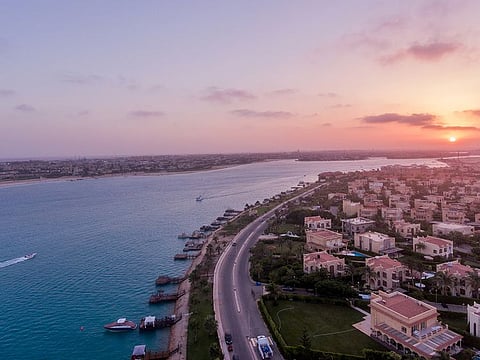Egypt hopes $35 billion UAE deal means tourist bonanza
The country is aiming to double tourist arrivals to 30 million by the end of this decade

Egypt hopes its Mediterranean coast can attract millions of foreign tourists each year after the government agreed a huge development deal with the United Arab Emirates.
The northern coastline stretching west of Alexandria toward the Libyan border is already dotted with villas and chalets, many of them used as summer retreats by wealthy Egyptians looking to escape the stifling heat of Cairo.
But "it has not received its fair share of international tourism" due to a lack of hotels, Tourism Minister Ahmed Issa said in an interview. There are just 4,174 licensed rooms there, compared with about 87,000 at resorts on Egypt's eastern Red Sea coast, according to the government.
ADQ invests in Ras El-Hekma
Ras El-Hekma, a Mediterranean peninsula three times the size of Manhattan and where UAE wealth fund ADQ said it would invest billions of dollars, is a key part of the plan, Issa said.
The government expects to attract 8 million additional tourists to Ras El-Hekma, Prime Minister Mostafa Madbouly said Friday.
Hotel-builders are being offered incentives to quicken construction countrywide, while Egypt will allocate more promotional funds for the north coast from next year, according to Issa.
Tourism is key sector
Last year the North African nation recorded a record 14.9 million arrivals, mainly to Cairo and the Red Sea. Authorities target doubling that to 30 million by the end of the decade.
Despite being a sector vulnerable to regional instability, Issa said, visitor numbers between Jan. 1 and late February were 6 per cent higher than the same period in 2023.
ADQ last week said it would invest $35 billion to develop Ras El-Hekma and other areas in Egypt.
It appeared to mark a turning point for the country, with the government's dollar bonds rallying significantly. The average yield on those fell below 10 per cent on Wednesday for the first time in almost two years.
The enormous amount, some of which has already been transferred and the rest of which is meant to be paid in two months, will be enough to ease the $400 billion economy's dollar shortages. It may pave the way for a much-anticipated currency devaluation and a new International Monetary Fund deal.
Egyptian authorities are also renovating key tourist locations in Cairo, including the historic Islamic quarter, Issa said. The Grand Egyptian Museum, which has cost an estimated $1 billion and been in the works for years, is meant to rival the Giza pyramids as the capital's star attraction. He didn't disclose an opening date.
Sign up for the Daily Briefing
Get the latest news and updates straight to your inbox



